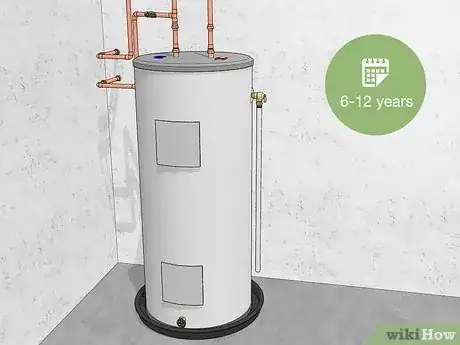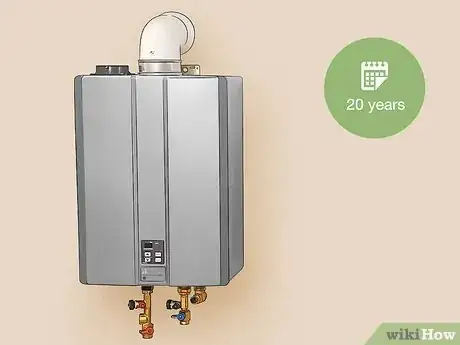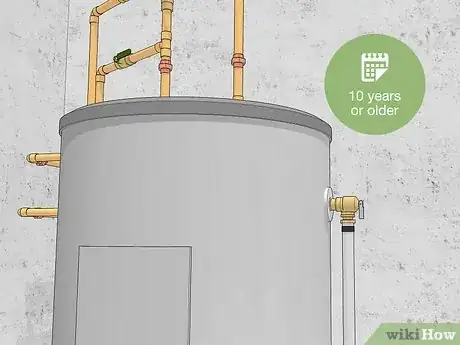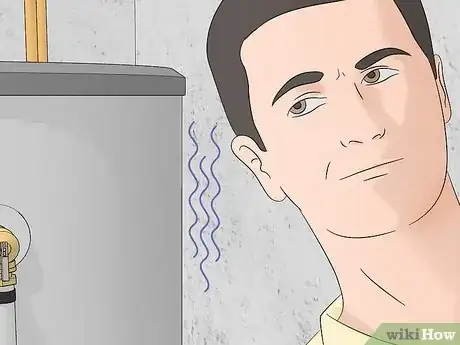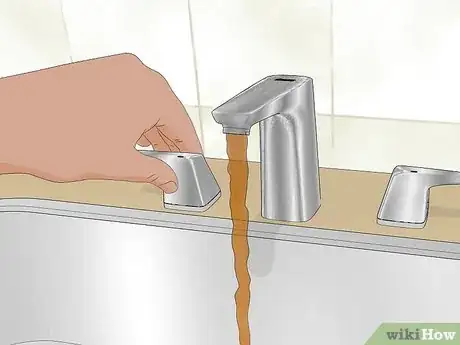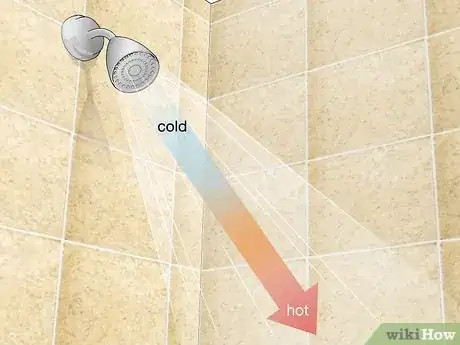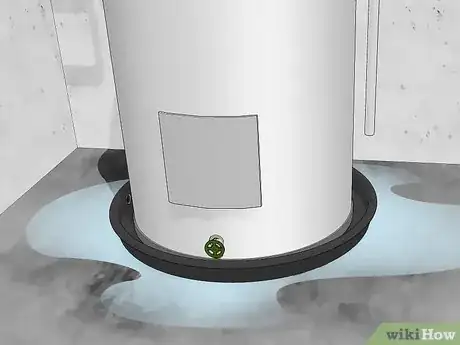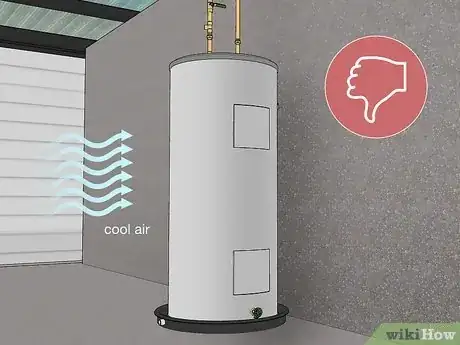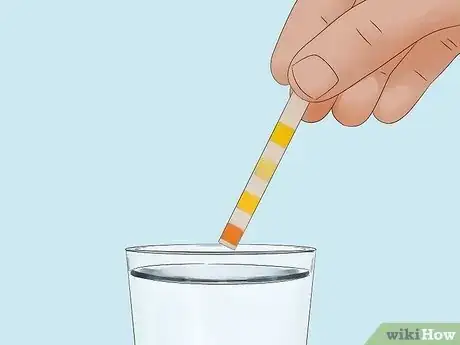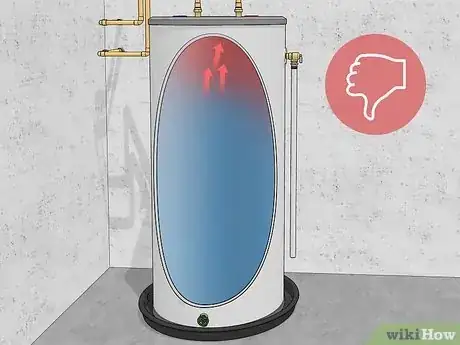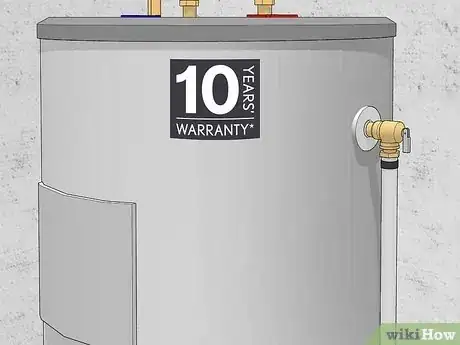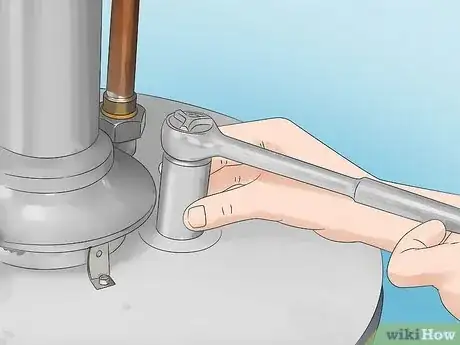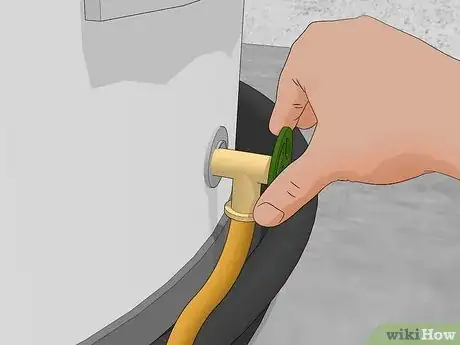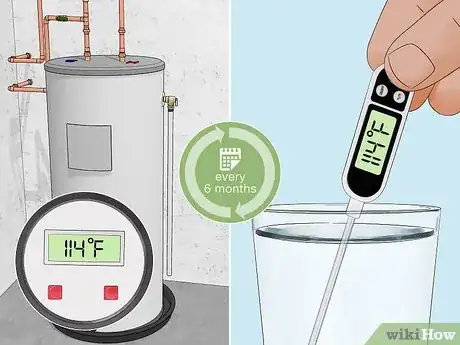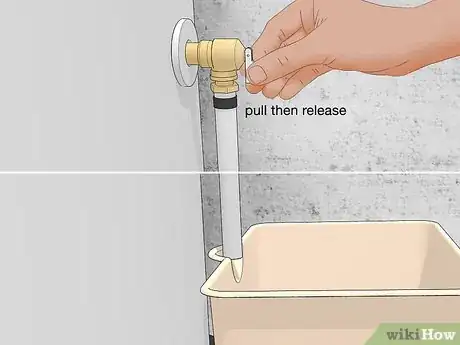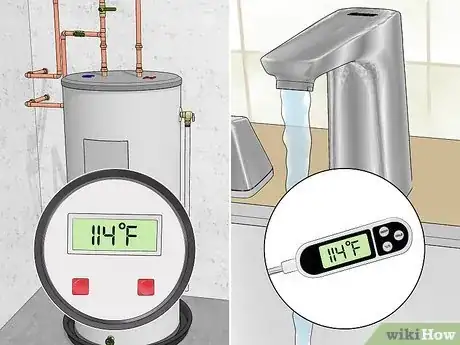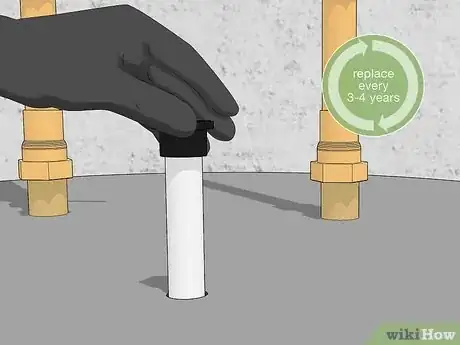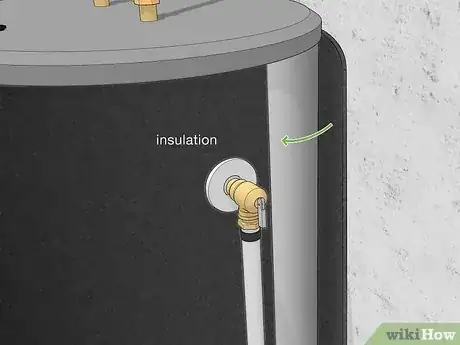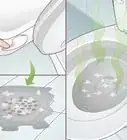This article was co-authored by wikiHow staff writer, Jennifer Mueller, JD. Jennifer Mueller is a wikiHow Content Creator. She specializes in reviewing, fact-checking, and evaluating wikiHow's content to ensure thoroughness and accuracy. Jennifer holds a JD from Indiana University Maurer School of Law in 2006.
There are 7 references cited in this article, which can be found at the bottom of the page.
This article has been viewed 3,101 times.
Learn more...
Your water heater is probably something you don't think about too much until you go to take a shower and the water runs cold. You can avoid that uncomfortable (and inconvenient) situation if you replace your old water heater before it fails. Read on to learn how long you can expect your water heater to last, as well as things you can do to ensure it lasts as long as possible.
Things You Should Know
- Expect your gas or electric storage water heater to last around 10 years. If you have a tankless water heater, it could last up to 20 years.
- Maximize your water heater's useful life by draining it once a year and flushing it quarterly.
- Look for leaks around the tank or rusty-colored water as sure signs you need to replace your old water heater.
Steps
Water Heater Lifespan
-
1Conventional storage water heaters last 6 to 12 years. There's not a significant difference between gas or electric water heaters. If your water heater has a tank that stores heated water for use, it typically lasts as long as the tank itself does. Eventually, the tank will start to corrode and you'll need to replace it.[1] X Research source
-
2Tankless water heaters last up to 20 years. Because they don't have a tank, these types of water heaters (also known as "on-demand" water heaters) can last twice as long as the conventional types. Electric tankless heaters tend to be more efficient than those that are gas-fired.[2] X Trustworthy Source U.S. Department of Energy Official site for the U.S. Department of Energy, which provides resources related to energy safety, conservation, and efficiency Go to source
Signs You Need a New Water Heater
-
1Your water heater is more than 10 years old. While a gas or electric conventional storage water heater can technically last as long as 12 years, it's a good idea to think about replacing your old one around the 10-year mark. This gives you some time to save up and budget the expense as well as plan ahead to schedule installation.[3] X Trustworthy Source Energy Star Program run by the U.S. Environmental Protection Agency and Department of Energy focused on educating consumers about energy efficiency Go to source
- It's always going to be better (and less expensive) to plan ahead for a replacement, even if your old one still seems to be working just fine.
-
2You hear banging or rumbling inside the heater. When your conventional storage water heater starts making noise, that's a sign that sediment has built up in the bottom of the tank. That noisy water heater is telling you it's only a matter of time before you're standing in a cold shower.[4] X Trustworthy Source Energy Star Program run by the U.S. Environmental Protection Agency and Department of Energy focused on educating consumers about energy efficiency Go to source
-
3Rusty water comes out of the tap when you turn on the hot water. Orange-colored water tells you the inside of your tank has started rusting. No one wants to shower in rusty water! Apart from that, if the rust hasn't eaten through the side of your tank yet, it's going to—sooner rather than later.[5] X Trustworthy Source Energy Star Program run by the U.S. Environmental Protection Agency and Department of Energy focused on educating consumers about energy efficiency Go to source
-
4Hot water doesn't last as long as it used to. When sediment builds up in the bottom of your tank, it takes up the space that was previously filled with water. That means your tank is heating less water and you have less hot water available. If the water goes cold halfway through your shower, it's probably time to look at replacing your water heater.[6] X Trustworthy Source Energy Star Program run by the U.S. Environmental Protection Agency and Department of Energy focused on educating consumers about energy efficiency Go to source
-
5Your tank is leaking or there are puddles around the unit. If your tank is leaking, you definitely need to replace it as soon as possible. Otherwise, you risk water damage to the area where your water heater is stored.[7] X Research source
Factors That Affect a Water Heater's Lifespan
-
1Your water heater's location in your home To get the most out of your water heater, have it professionally installed in a climate-controlled area where it has plenty of ventilation. Make sure it's easy to access for regular maintenance and small repairs.[8] X Research source
- If your water heater is out in a garage or another area that isn't climate-controlled, it will have to work harder to heat your water, which will cause it to die more quickly.
-
2The quality of your water Your local water quality can significantly impact the longevity of your water heater. Soft water increases the risk of corrosion, while hard water leads to limescale buildup. Both of these problems reduce the efficiency of your water heater and ultimately cause it to fail faster than it would otherwise.[9] X Research source
- Fortunately, there are ways to lessen the impact. Start by testing your water quality. If you have hard water, you can soften it to lengthen the useful life of your water heater.
-
3How much water you use When you constantly drain your water heater, it has to work that much harder to heat the water. This can significantly shorten the lifespan of your water heater.[10] X Research source
- If you have a conventional storage water heater and use a lot of hot water, you might upgrade to a larger tank—it'll last longer.
- If you have or want a tankless water heater, find the best size for your household by figuring out what temperature rise and flow rate you need.
-
4The construction quality of your unit Higher quality water heaters will cost a bit more, but they also tend to last longer. When you're buying a new water heater, research models and manufacturers to find the best fit for your budget.[11] X Research source
- Manufacturers will typically provide longer warranties for better-quality units. Look for a unit with at least a 10-year warranty.
-
5How well you've maintained your unit Water heaters don't actually need a ton of maintenance, but if you tend to yours every few months it'll last you a lot longer. Just make it part of your spring cleaning to drain your water heater to add a year or two to its useful life.[12] X Research source
- While you can have a pro come out and perform basic maintenance on your water heater, this is also something you can easily do yourself if you want to save a little money.
Proper Water Heater Maintenance
-
1Drain your tank every year to remove sediment. If you have a conventional storage water heater, just turn off the power to the water heater and drain all the water out of the tank. Then, open the cold-water supply valve briefly to stir up the sediment in the bottom of the tank. Drain that out and you should be good to go! Just close the drain cock and refill the tank.[13] X Research source
- The US Department of Energy also recommends flushing a quart of water from the storage tank once every 3 months to keep sediment from building up. This makes draining a much easier job![14] X Trustworthy Source U.S. Department of Energy Official site for the U.S. Department of Energy, which provides resources related to energy safety, conservation, and efficiency Go to source
-
2Check the temperature and pressure valve every 6 months. These parts are relatively cheap and easy to replace if they go bad. Keeping them functioning properly can help your water heater last longer and work more efficiently.[15] X Trustworthy Source U.S. Department of Energy Official site for the U.S. Department of Energy, which provides resources related to energy safety, conservation, and efficiency Go to source
- To check the pressure valve, shut off the power and cold-water supply to your unit. Place a bucket under the pipe connected to the valve (it'll be on the top or side of your tank). Lift the valve's tab to let some water out, then let it go. If water keeps flowing after you let it go, call a pro and get it replaced.[16] X Research source
- As far as temperature is concerned, just make sure the water coming out of your tap matches the temperature setting on your water heater. If they don't match, call a pro to come and look at your unit.
-
3Replace the anode rod every 3-4 years. The anode rod can get limescale buildup, especially if you have hard water. It's screwed into the top of your tank—just unscrew it to see if it has buildup. If it looks like it's covered in lumpy chalk, call a pro to replace it.[17] X Trustworthy Source U.S. Department of Energy Official site for the U.S. Department of Energy, which provides resources related to energy safety, conservation, and efficiency Go to source
- Be careful with this if your water heater is still under warranty. Anode replacement voids some warranties—call the manufacturer before you schedule the work.[18] X Research source
-
4Insulate your tank so your heater doesn't have to work as hard. Wrap an insulating blanket around your water heater so it'll lose less heat. This is especially helpful if your water heater is located in an area of your home that isn't climate-controlled.[19] X Research source
- If you live in a warm climate where it seldom (if ever) gets below freezing, this might seem like overkill. But the water in your tank is around 120 °F (49 °C)—you're still going to have some ambient heat loss, even in a relatively warm space.
Other wikiHows

 How to Relieve & Prevent Headaches & Migraines Fast
How to Relieve & Prevent Headaches & Migraines Fast
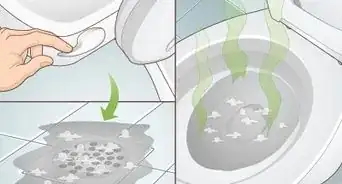 How to Unclog a Toilet: With a Plunger and without a Plunger
How to Unclog a Toilet: With a Plunger and without a Plunger

 How to Take a Screenshot on a Windows PC: 8 Simple Tricks
How to Take a Screenshot on a Windows PC: 8 Simple Tricks
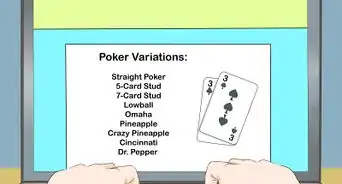
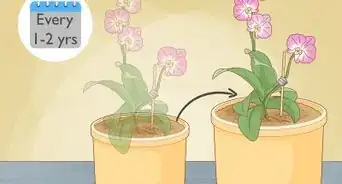 How to Take Care of Potted Orchids
How to Take Care of Potted Orchids

References
- ↑ https://www.nachi.org/life-expectancy.htm
- ↑ https://www.energy.gov/energysaver/tankless-or-demand-type-water-heaters
- ↑ https://www.energystar.gov/products/ask-the-experts/when-should-you-replace-your-water-heater
- ↑ https://www.energystar.gov/products/ask-the-experts/when-should-you-replace-your-water-heater
- ↑ https://www.energystar.gov/products/ask-the-experts/when-should-you-replace-your-water-heater
- ↑ https://www.energystar.gov/products/ask-the-experts/when-should-you-replace-your-water-heater
- ↑ https://www.nachi.org/lifespan-water-heater.htm
- ↑ https://www.nachi.org/lifespan-water-heater.htm
- ↑ https://www.pnnl.gov/main/publications/external/technical_reports/PNNL-22921.pdf
- ↑ https://www.nachi.org/lifespan-water-heater.htm
- ↑ https://www.nachi.org/lifespan-water-heater.htm
- ↑ https://www.nachi.org/lifespan-water-heater.htm
- ↑ https://www.thisoldhouse.com/plumbing/21016402/how-to-maintain-a-water-heater
- ↑ https://www.energy.gov/energysaver/storage-water-heaters
- ↑ https://www.energy.gov/energysaver/storage-water-heaters
- ↑ https://www.thisoldhouse.com/plumbing/21016402/how-to-maintain-a-water-heater
- ↑ https://www.energy.gov/energysaver/storage-water-heaters
- ↑ https://www.nachi.org/lifespan-water-heater.htm
- ↑ https://www.thisoldhouse.com/plumbing/21016402/how-to-maintain-a-water-heater
About This Article

